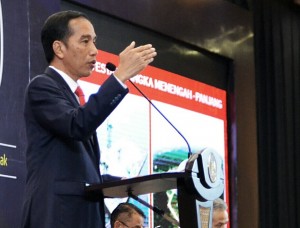Government Prepares Investment Instruments, President Joko Widodo Says

President Joko Widodo explains tax amnesty program in Semarang (9/8) (Picture: Public Relations Office/Oji)
The pressure of global economy, according to President Joko Widodo, is caused by uncertainty in economic and geopolitic sectors. Then, it encourages all countries to withdraw their investment so that the money flows in to their countries.
Indonesia also does the same action by applying the tax amnesty program.
The President expects the money, either it comes from abroad or from inside the country, can be direclty used for investment.
The Government has prepared investment instrument portfolios, such as State Securities (SBN), State Debentures (SUN), Government Sharia Securities (Sukuk). In State-Owned Enterprises, the instruments could be obligation, stocks, infrastructure, mutual fund, deposit, giro, and savings. The money can flow in through these instruments to several appointed banks, the President said in tax amnesty program dissemination at Rama Shinta Ballroom, Patra Jasa Hotel, Semarang, Central Java, on Tuesday (9/8) evening.
President Joko Widodo firmly said that Indonesia must be ready to compete with other countries. With the rapid changes, the President added, the Government must rapidly make a decision so that Indonesia would not be left behind. Usually, we work in one or two shifts. I want more. It should be three shifts. We must catch up. It is a need not a desire, he said.
According to the President, until the second quarter, Indonesias economic growth shows positive sentiment and the trend continues to increase. At the first quarter, it grows 4.94 percent. At the second quarter, it increases 5.18 percent. Its rising. This opportunity must be used. Dont lose it, the President said.
Choices of Investment Sectors
Besides investment instrument portfolios, according to the President, the money can be invested in a number of promising sectors, such as infrastructure, labor-intensive projects, maritime, agriculture, tourism, and property. The Government will divide these sectors in three categories: big, medium, and small, so that the investors can choose their preferred categories.
At the moment, the Government is mainly focused on infrastructure. The investors can join the construction of seaports. They can choose the big projects, for example Kuala Tanjung Seaport, Tanjung Priok Seaport, Makassar New Port, Sorong Seaport, or join the small projects, the President explained.
The investors can also invest in other infrastructures, for example toll road construction in several regions, such as Sumatera (from Lampung to Aceh), Kalimantan (from Balikpapan to Samarinda), and Sulawesi (from Manado to Bitung); railway construction (Sumatera and Sulawesi); mass transportation in big cities, like MRT (Mass Rapid Transit) in Jakarta and LRT (Light Rail Transit) in Greater Jakarta and Palembang; airports construction; and power plants, either big, medium, or small scales.
Indonesia has been independent for 71 years, but its electricity reaches only 53 thousands megawatt (MW). The target is 35 thousands MW in five years, the President added while explaining the opportunities in electricity sector still open.
Another sector that gives a lot of opportunities is labor-intensive sector that can provide employment, such as automotive and garment/textile. To stimulate investment in this sector, the Government promises to simplify permitting process.
If someone or some companies want to open a factory that needs a lot of labors, they must be given the chance to opent it. Help them with permitting process. Dont make it difficult. If the process can be finished in one day, then make it happen, the President explained.
The President said that previously, one permit in Investment Coordinating Board (BKPM) takes months to finish. Now, eight permits can be finished in three hours. To speed up the process, the President added, the Government has also eliminate 3,153 regional regulations (perda) out of 42,000 regulations. The purpose is to accelerate the development in various sectors.
In fishery sector, investors can invest their money in cold storage and canning plant constructions. The President explained that the opportunities in this sector still widely open because two-thirds of Indonesias territory are waters.
This sector is really promising because since last year, the President committed to fighting againts illegal vessels. There are 176 vessels that have been sinked by Minister of Maritime Affairs and Fisheries, Susi Pudjiastuti, the President stated.
Agriculture sector is also promising, particularly sugar and corn commodities. The President explained that, currently, Indonesia still imports 3.4 million tons of sugar per year. It means, there are opportunities to build sugar factory, to develop sugar plantation, etc. The President also mentioned that Indonesia still imports 3.2 million tons of corn per year.
In tourism sector, the President affirmed that the Government is now promoting ten Indonesias tourism destinations besides Bali. They are Lake Toba, Tanjung Layang, Mandalika, Wakatobi, Morotai, Komodo, Thousands Islands, Borobudur, Bromo Tengger, and Tanjung Lesung.
The President firmly said that Indonesia will continue the efforts to increase the number of tourists visiting Indonesia, that now only reaches 9 million. This number is still below Malaysia that reaches 24 million per year, and Thailand 27 million per year. One of the efforts is to improve the brand image and build the infrastructure.
If there is a chance to build a resort, lets build it. Our target is by 2019, there will be 20 million tourists visiting Indonesia. We must work hard to achieve the target. This year, the target is 12 million, the President added.
The Government also opens investment in property sector to meet housing need since, in the city, in 2016, it still lacks of 13 million of houses.
The President firmly said that there would be no more tax amnesty program, thus, it must be used to the maximum extent possible. (RMI/DID/OJI/ES)(MMB/YM/Naster)








